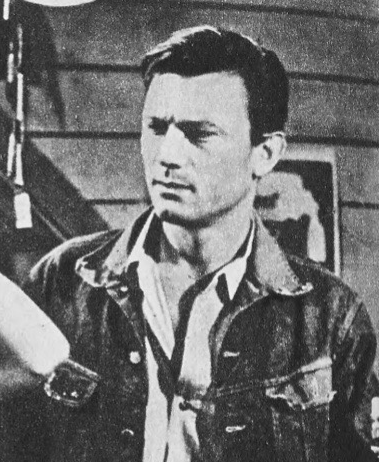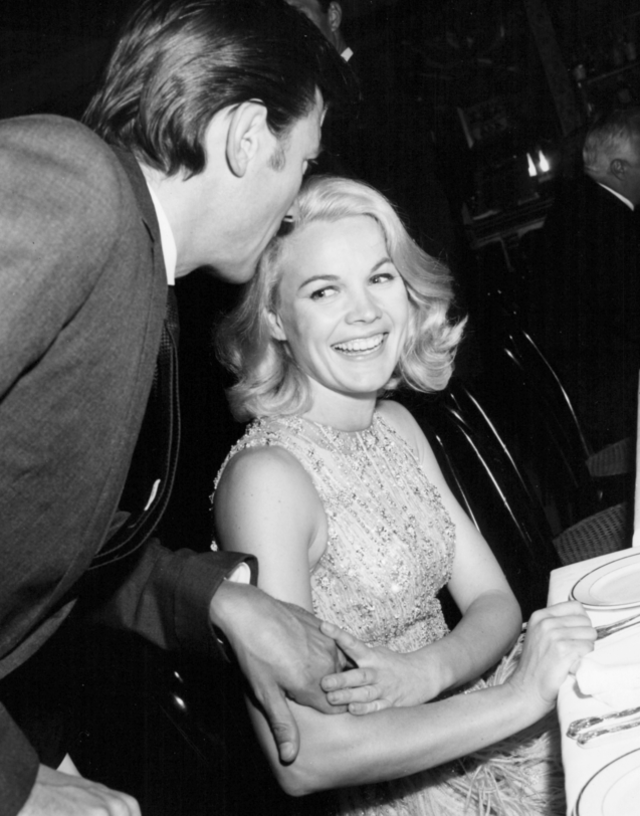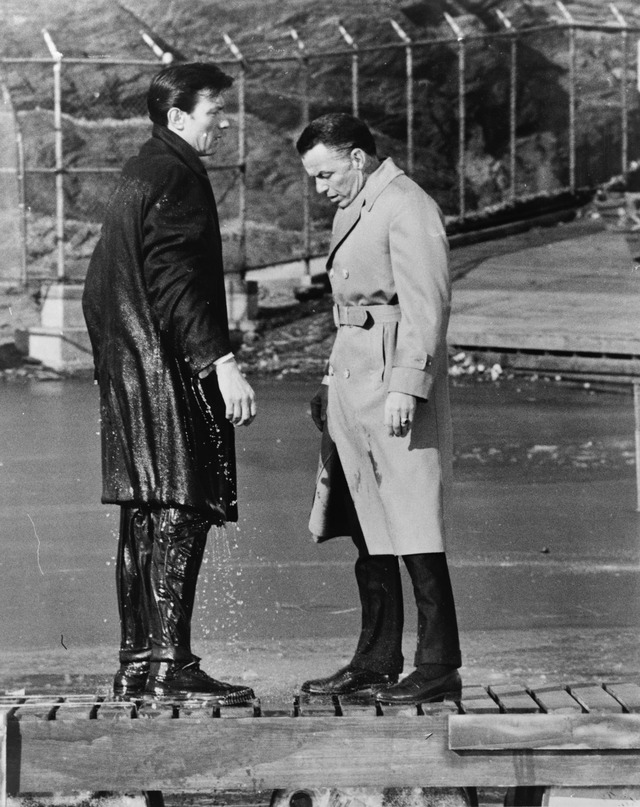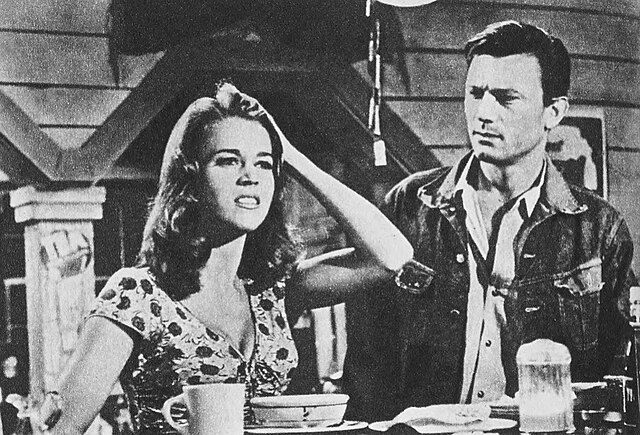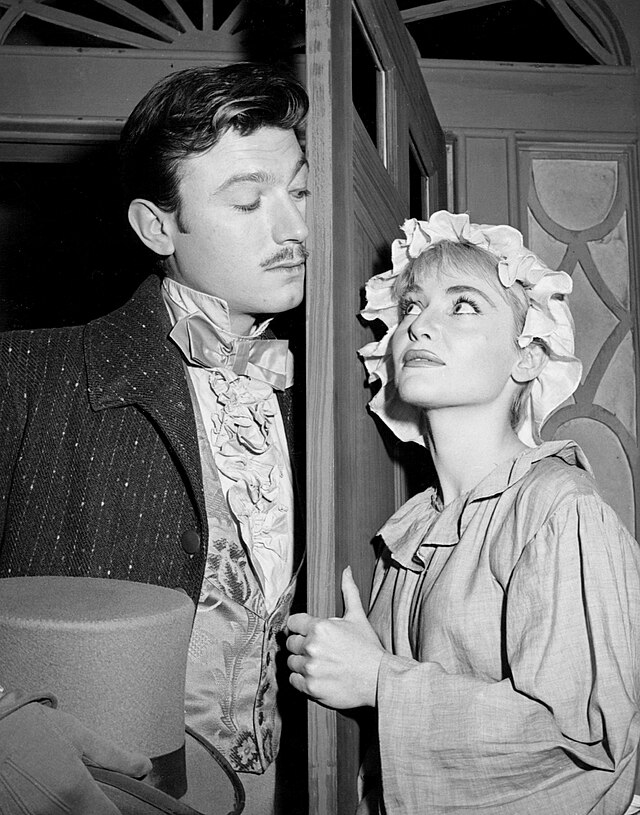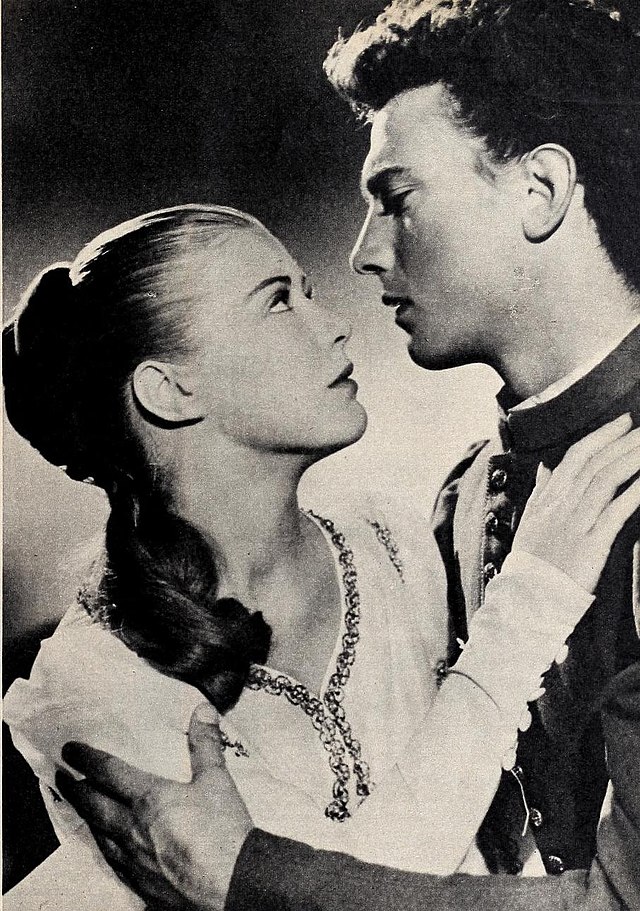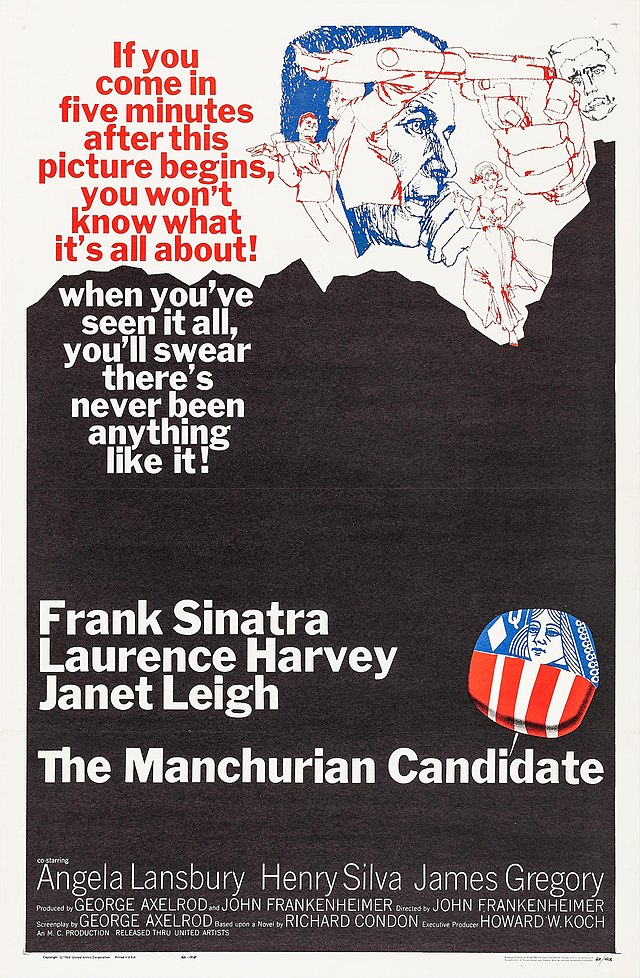Laurence Harvey
Biography and Movie Career
Early Life and Background
Laurence Harvey, born Zvi Mosheh Skikne on October 1, 1928, in Joniškis, Lithuania, was the youngest of three sons in a Jewish family. His family emigrated to South Africa when he was a child, escaping the rising tide of antisemitism in Europe. Growing up in Johannesburg, he attended King Edward VII School and showed early interest in the arts, particularly theater.
After completing his schooling, Harvey enlisted in the South African Army during World War II. Upon returning to civilian life, he decided to pursue his dream of acting. His striking good looks, refined demeanor, and natural flair for performance led him to the Royal Academy of Dramatic Art (RADA) in London, where he honed his craft.
The Path Toward Stardom
Harvey began his acting career in repertory theater, but his talent soon caught the attention of filmmakers. He changed his name from Zvi Mosheh Skikne to Laurence Harvey, choosing a more marketable stage name as he transitioned into British cinema in the late 1940s. His first major role came in House of Darkness (1948), but it was his performance in Room at the Top (1959) that propelled him to international stardom.
In Room at the Top, Harvey played Joe Lampton, an ambitious working-class man determined to climb the social ladder. The role earned him an Academy Award nomination for Best Actor and solidified his reputation as a leading man with a dark, brooding intensity.
Hollywood Success and Iconic Roles
Following his breakout success, Harvey became a sought-after actor in both British and American films. He starred alongside Elizabeth Taylor in Butterfield 8 (1960), John Wayne in The Alamo (1960), and Frank Sinatra in the political thriller The Manchurian Candidate (1962). His ability to portray complex, often morally ambiguous characters made him a versatile and compelling actor.
Harvey also appeared in Darling (1965), opposite Julie Christie, and reprised his role as Joe Lampton in Life at the Top (1965), further cementing his legacy in British cinema.
Personal Life and Passions
Laurence Harvey's personal life was as dramatic and complicated as the characters he portrayed on screen. He was married three times:
• His first wife was actress Margaret Leighton, whom he married in 1957. Their marriage ended in divorce in 1961.
• In 1968, Harvey married Joan Cohn, widow of producer Harry Cohn. The marriage was short-lived, and they divorced in 1972.
• His third marriage was to model Paulene Stone in 1972. The union produced his only child, a daughter named Domino Harvey, who later became a bounty hunter and tragically struggled with personal issues.
Harvey was known for his charisma, sophistication, and love of the finer things in life. He was an art collector, a gourmand, and a lover of literature. Despite his fame and wealth, he was also perceived as enigmatic and sometimes aloof, maintaining an air of mystery that fascinated those around him.
Final Years and Death
In the early 1970s, Harvey's career began to wane, and he turned his attention to directing. However, his life was cut short by illness. He was diagnosed with stomach cancer, a condition he kept private from the public. Laurence Harvey passed away on November 25, 1973, at the age of 45, in London.
He was buried in Hampstead Cemetery in London, where his grave remains a place of tribute for fans and admirers. His untimely death marked the end of a brilliant but turbulent career, leaving behind a legacy of unforgettable performances and an indelible mark on cinema.
Legacy
Laurence Harvey's work continues to be celebrated for its depth and intensity. Films like The Manchurian Candidate and Room at the Top are regarded as classics, and his ability to convey inner conflict and ambition remains influential. Though his life was relatively short, his contributions to film and theater have ensured his place among the great actors of his time.
Laurence Harvey Measurements
Laurence Harvey was known for his lean and elegant physique, which contributed to his striking on-screen presence.
• Height: 6 feet 0 inches (183 cm)
• Weight: Approximately 160 pounds (73 kg)
• Build: Slim and athletic, with a naturally lean frame that suited his roles as sophisticated and intense characters.
He maintained a sharp, tailored appearance, often seen in well-fitted suits that complemented his tall and lean physique, adding to his aura of refinement and charisma.
The Tragic Life of Laurence Harvey
Elegant Acting Style of Laurence Harvey
Laurence Harvey's acting style was distinctive and layered, marked by a combination of brooding intensity, emotional depth, and an often enigmatic presence. He brought a unique blend of sophistication and detachment to his roles, making him stand out among his contemporaries.
________________________________________
Elegance and Control
Harvey's performances were characterized by a certain elegance, both in his physical demeanor and his vocal delivery. His well-modulated voice, often tinged with a subtle European accent, lent a refined air to his characters. This vocal precision was complemented by his measured body language, which conveyed a sense of control and deliberation. Whether playing a ruthless social climber or a tormented soul, Harvey’s poise on screen suggested an actor deeply in command of his craft.
________________________________________
Complexity and Ambiguity
One of the hallmarks of Harvey’s acting was his ability to portray morally ambiguous characters. In films like Room at the Top (1959), he embodied the ambition and inner turmoil of Joe Lampton, a working-class man determined to rise in a rigid social structure. Harvey skillfully revealed the layers of his character's psyche, from confidence and charm to vulnerability and desperation. His performances often left audiences questioning whether to empathize with or condemn his characters, a testament to his ability to explore the gray areas of human emotion.
________________________________________
Intensity and Brooding Presence
Harvey possessed a magnetic intensity that could dominate a scene. This was particularly evident in films like The Manchurian Candidate (1962), where he played Raymond Shaw, a man manipulated into becoming an assassin. Harvey’s portrayal captured Shaw’s haunted demeanor and inner conflict, showcasing his talent for conveying emotional turmoil with subtlety. His sharp, angular features and piercing gaze amplified his ability to project an almost hypnotic screen presence.
________________________________________
Versatility and Adaptability
Though often associated with sophisticated or tormented roles, Harvey demonstrated a notable versatility. He could transition from period dramas, such as King Richard and the Crusaders (1954), to romantic comedies like Three Men in a Boat (1956). While his dramatic roles often highlighted his intensity, his work in lighter films revealed a surprising comedic timing and charm, suggesting an actor unafraid to explore different facets of his artistry.
________________________________________
Subtle Emotional Resonance
Harvey’s acting was less about overt displays of emotion and more about the nuances of expression and tone. He excelled at portraying characters whose true feelings simmered beneath the surface, requiring the audience to look deeper for meaning. This subtlety, while sometimes criticized as cold or aloof, was in fact a deliberate choice that added depth to his performances.
________________________________________
Challenges and Legacy
Despite his talent, Harvey’s acting style was sometimes polarizing. Critics occasionally found his performances overly mannered or detached, but this coolness was also what made him compelling. He was particularly adept at playing characters who were outsiders, whether due to social status, emotional isolation, or moral conflict, reflecting his own enigmatic personality.
Harvey’s style paved the way for more modern, introspective performances, influencing actors who sought to blend charisma with complexity. Though his career was cut short, his work remains a study in the power of restraint, precision, and the exploration of human contradictions.
Memorable Quotes
On Acting and His Career:
• "I am a success of a sort. It is not the kind of success I wanted, but it is success nonetheless."
A candid acknowledgment of his mixed feelings about his career trajectory, reflecting his complex relationship with fame.
• "Being a film actor is something I feel I ought to do, not something I particularly enjoy doing."
Harvey often expressed a sense of detachment from the film industry, emphasizing his love for theater over cinema.
• "I've always felt there’s something rather shoddy about acting. Actors spend their lives exhibiting emotions they don’t feel, and others live off that."
A thought-provoking reflection on the nature of acting as an art form.
________________________________________
On Life and Fame:
• "I’ve made films to pay the rent. I’ve made films because they were artistic. I’ve made films because I was broke."
An honest comment on the pragmatic and artistic reasons behind his choice of roles.
• "I’ve always had to fight hard for what I've achieved. Nothing has ever come easily for me."
A personal insight into his resilience and determination throughout his career.
________________________________________
On Relationships:
• "The trouble with marriage is that while every woman has her price, not every man has the means to meet it."
A wry observation on the challenges of relationships, possibly reflecting his own tumultuous personal life.
• "I’ve always preferred the company of women—they’re much more interesting than men."
A charming remark that aligns with his reputation as a sophisticated and debonair figure.
________________________________________
On Himself:
• "I'm vain, yes. All actors are vain. It's part of the equipment."
A humorous and self-aware acknowledgment of the ego often associated with performers.
• "I never thought of myself as a star. I’m a working actor, and that’s enough."
A modest take on his own career despite his undeniable fame.
Praise for His Talent
• Elizabeth Taylor (co-star in Butterfield 8):
o "Laurence had an extraordinary intensity, a presence that couldn’t be ignored. He was utterly captivating on screen."
o Taylor admired his ability to command attention, even in scenes shared with other strong performers.
• Frank Sinatra (co-star in The Manchurian Candidate):
o "Larry was a professional, a real actor’s actor. He had this enigmatic charm that made him fascinating to watch."
o Sinatra recognized Harvey’s discipline and the enigmatic quality that defined his performances.
• Critics on Room at the Top (1959):
o "Harvey gives a raw, brooding performance as Joe Lampton, capturing the hunger and desperation of a man determined to climb the social ladder."
o This role solidified Harvey's reputation as a serious and talented actor.
________________________________________
Criticism and Mixed Opinions
• John Wayne (co-star and director in The Alamo):
o "Larry was a bit of a cold fish. He could act, sure, but he didn’t always connect with people the way you’d expect."
o Wayne found Harvey professional but distant, reflecting a common perception of Harvey’s detached demeanor.
• Critics on His Style:
o "Harvey could be accused of being overly mannered at times, with a stiffness that alienated audiences. Yet, this same quality made him perfect for certain roles."
o Critics often noted his reserved acting style, which could come across as cold but worked well for morally complex characters.
• Laurence Olivier (legendary actor):
o "Laurence Harvey was a fine actor, but his personality could make him difficult to work with. He had a sharp edge that some found hard to handle."
o Olivier acknowledged his skill but hinted at his challenging reputation.
________________________________________
On His Personality
• Joan Collins (friend and contemporary):
o "Laurence was a bit of a loner. He had this air of mystery about him that made him intriguing but also hard to get close to."
o Collins highlighted his enigmatic personality, which was both a strength and a limitation.
• Margaret Leighton (first wife):
o "Larry was brilliant but restless, always searching for something. It’s what made him great, but it also made him hard to live with."
o Leighton offered insight into the complexities of his personal life and how it impacted his relationships.
________________________________________
Posthumous Reflections
• Film Critics:
o "Laurence Harvey was one of the most compelling yet underrated actors of his time. He brought a cerebral quality to his performances that made them unforgettable."
o Critics have reassessed his contributions, appreciating his nuanced portrayals and ability to tackle difficult roles.
• Domino Harvey (daughter):
o "I didn’t really know my father, but the stories people tell me paint him as a complicated, intense man with a lot of talent."
o Domino acknowledged the distant relationship she had with her father, a reflection of his busy and often tumultuous life.
Awards and Recognition
Academy Awards (Oscars):
• 1959: Nominated for Best Actor in a Leading Role for his performance as Joe Lampton in Room at the Top.
British Academy Film Awards (BAFTA):
• 1959: Nominated for Best British Actor for Room at the Top.
• 1960: Nominated for Best British Actor for Expresso Bongo.
Golden Globe Awards:
• 1963: Nominated for Best Actor in a Motion Picture – Drama for his role in The Wonderful World of the Brothers Grimm.
• 1968: Won the Henrietta Award for World Film Favorite – Male.
Laurel Awards:
• 1960: Nominated for Top Male New Personality.
New York Film Critics Circle Awards:
• 1959: Nominated for Best Actor for Room at the Top.
Western Heritage Awards:
• 1961: Won the Bronze Wrangler for Theatrical Motion Picture for The Alamo, shared with James Edward Grant, Richard Widmark, and John Wayne.
Theatre World Award:
• 1956: Received the Theatre World Award, recognizing his performance in the theater.
Grammy Awards:
• 1963: Nominated for Best Documentary or Spoken Word Recording (Other Than Comedy) for the album This Is My Beloved.
Movies with Laurence Harvey
1948
• House of Darkness: Harvey's film debut as Francis Merryman in this British thriller about a haunted house and family secrets.
1949
• Man on the Run: Harvey plays a minor role in this drama about a deserter from the British Army who becomes entangled in a criminal plot.
1950
• Landfall: A wartime drama where Harvey appears as a supporting character in a story about a British pilot involved in a mistaken bombing.
• The Black Rose: Harvey portrays Edmond in this historical adventure about a 13th-century Englishman traveling to China.
1951
• There Is Another Sun: Harvey stars as Eddie, a fairground boxer who becomes involved in a love triangle and a dangerous rivalry.
1952
• Innocents in Paris: A comedy featuring Harvey as François, a French character in a series of vignettes about British travelers in Paris.
• Women of Twilight: Harvey plays a supporting role in this drama about unwed mothers living in a boarding house.
1953
• Scarlet Thread: Harvey stars as a man who becomes romantically involved with a woman suspected of murder.
1954
• The Good Die Young: Harvey portrays Miles 'Rave' Ravenscourt, a bankrupt playboy who leads three other men into a botched robbery.
• King Richard and the Crusaders: Harvey plays Sir Kenneth of Huntington in this historical epic about the Third Crusade.
• Romeo and Juliet: Harvey takes on the role of Romeo in this Italian-British adaptation of Shakespeare's tragic love story.
1955
• I Am a Camera: Harvey stars as Christopher Isherwood in this adaptation of his memoirs, focusing on his life in 1930s Berlin.
• Storm Over the Nile: Harvey plays John Durrance in this adventure film about a British officer accused of cowardice.
1956
• Three Men in a Boat: A comedic tale where Harvey portrays George, one of three friends on a boating holiday on the Thames.
1957
• After the Ball: Harvey stars as Walter de Frece in this biographical musical about the life of music hall star Vesta Tilley.
1958
• The Silent Enemy: Harvey portrays Lieutenant Crabb in this war film about British divers combating Italian frogmen during World War II.
• The Truth About Women: Harvey plays Sir Humphrey Tavistock, recounting his romantic escapades over the years.
1959
• Room at the Top: Harvey's acclaimed role as Joe Lampton, an ambitious man determined to climb the social ladder through any means necessary.
• Expresso Bongo: Harvey stars as Johnny Jackson, a sleazy talent agent who discovers a young singer in Soho.
1960
• The Alamo: Harvey portrays Colonel William Barret Travis in this historical epic about the 1836 Battle of the Alamo.
• Butterfield 8: Harvey plays Weston Liggett, a married man entangled in a tumultuous affair with a fashionable call girl.
1961
• The Long and the Short and the Tall: Harvey stars as Private 'Bammo' Bamforth in this war drama about British soldiers in the Burmese jungle during World War II.
• Two Loves: Harvey portrays Paul Lathrope, a schoolteacher in New Zealand who becomes romantically involved with a colleague.
• Summer and Smoke: Harvey plays Dr. John Buchanan Jr., a young doctor who becomes the object of a minister's daughter's affections.
1962
• Walk on the Wild Side: Harvey stars as Dove Linkhorn, a Texan searching for his lost love in New Orleans, leading him to a brothel.
• The Wonderful World of the Brothers Grimm: Harvey portrays Wilhelm Grimm in this fantasy film about the famous storytelling siblings.
• The Manchurian Candidate: Harvey plays Raymond Shaw, a Korean War veteran brainwashed into becoming an unwitting assassin.
• A Girl Named Tamiko: Harvey stars as Ivan Kalin, a photographer in Tokyo torn between his career ambitions and romantic entanglements.
1963
• The Running Man: Harvey portrays Rex Black, a man who fakes his own death to collect insurance money, leading to a life on the run.
• The Ceremony: Harvey directs and stars as Sean McKenna, a man imprisoned for robbery whose brother plans a daring rescue.
1964
• Of Human Bondage: Harvey plays Philip Carey, a club-footed artist who becomes infatuated with a cruel waitress.
• The Outrage: Harvey portrays Colonel Wakefield in this Western remake of Akira Kurosawa's Rashomon, exploring differing perspectives of a crime.
1965
• Darling: Harvey stars as Miles Brand, a suave magazine editor who becomes one of the many lovers of a young model in swinging London.
• Life at the Top: Harvey reprises his role as Joe Lampton, now facing the challenges of maintaining his status and dealing with personal disillusionment.
1966
• The Spy with a Cold Nose: Harvey plays a veterinarian involved in a comedic espionage plot involving a dog implanted with a listening device.
1967
• A Dandy in Aspic: Harvey stars as Eberlin, a British spy assigned to eliminate a Soviet agent, unaware that he himself is the target.

